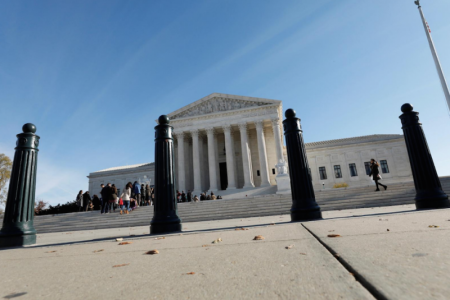Supreme Court blocks COVID-19 vaccine mandate for businesses, allows mandate for health workers

The U.S. Supreme Court has blocked the Biden administration’s COVID-19 vaccine mandates for large businesses that took effect this week while allowing another mandate for healthcare workers to proceed.
In a pair of per curiam decisions released Thursday, the high court offered a mixed message on President Joe Biden’s efforts to mandate vaccination against COVID-19.
In the case of Ohio et al v. Occupational Safety and Health Administration, et al., the Supreme Court issued a temporary stay blocking a requirement for businesses with 100 or more employees to require their employees to get vaccinated or tested regularly.
“Applicants are likely to succeed on the merits of their claim that the Secretary lacked authority to impose the mandate,” the ruling states. “Administrative agencies are creatures of statute. They accordingly possess only the authority that Congress has provided.”
“The Secretary has ordered 84 million Americans to either obtain a COVID–19 vaccine or undergo weekly medical testing at their own expense,” the ruling added. “This is no ‘everyday exercise of federal power.’”
Justices Stephen Breyer, Sonia Sotomayor and Elena Kagan dissented from the unsigned opinion in the Ohio case, arguing that the employee mandate was a valid response to the dangers of the coronavirus.
“In our view, the Court’s order seriously misapplies the applicable legal standards. And in so doing, it stymies the Federal Government’s ability to counter the unparalleled threat that COVID–19 poses to our Nation’s workers,” they argued.
“Acting outside of its competence and without legal basis, the Court displaces the judgments of the Government officials given the responsibility to respond to workplace health emergencies.”
In the case of Biden et al v. Missouri, et al., the high court concluded that “healthcare facilities that wish to participate in Medicare and Medicaid have always been obligated to satisfy a host of conditions that address the safe and effective provision of healthcare, not simply sound accounting.”
“Vaccination requirements are a common feature of the provision of healthcare in America: Healthcare workers around the country are ordinarily required to be vaccinated for diseases such as hepatitis B, influenza, and measles, mumps, and rubella,” noted the per curiam opinion.
“We accordingly conclude that the Secretary did not exceed his statutory authority in requiring that, in order to remain eligible for Medicare and Medicaid dollars, the facilities covered by the interim rule must ensure that their employees be vaccinated against COVID–19.”
Justice Clarence Thomas authored a dissenting opinion. He was joined by Justices Samuel Alito, Neal Gorsuch and Amy Coney Barrett. Thomas argued that the government failed to justify its mandate.
“These cases are not about the efficacy or importance of COVID–19 vaccines. They are only about whether [the Centers for Medicare and Medicaid Services] has the statutory authority to force healthcare workers, by coercing their employers, to undergo a medical procedure they do not want and cannot undo,” wrote Thomas.
“Because the Government has not made a strong showing that Congress gave CMS that broad authority, I would deny the stays pending appeal.”
Last September, President Joe Biden announced that there would be federally enforced mandates requiring vaccination against COVID-19 for both government workers and the private sector.
The federal rules would allow for certain exemptions, excluding employees of the U.S. Postal Service, members of Congress, businesses with fewer than 100 workers, and, in principle, individuals who had a valid religious or medical reason.
Critics argued the mandates were examples of federal overreach and also failed to adequately respect religious objections to the COVID-19 vaccine.
As a result, multiple lawsuits were filed against the mandates as they were announced and took effect, with the challenges from states and others having mixed results.





















